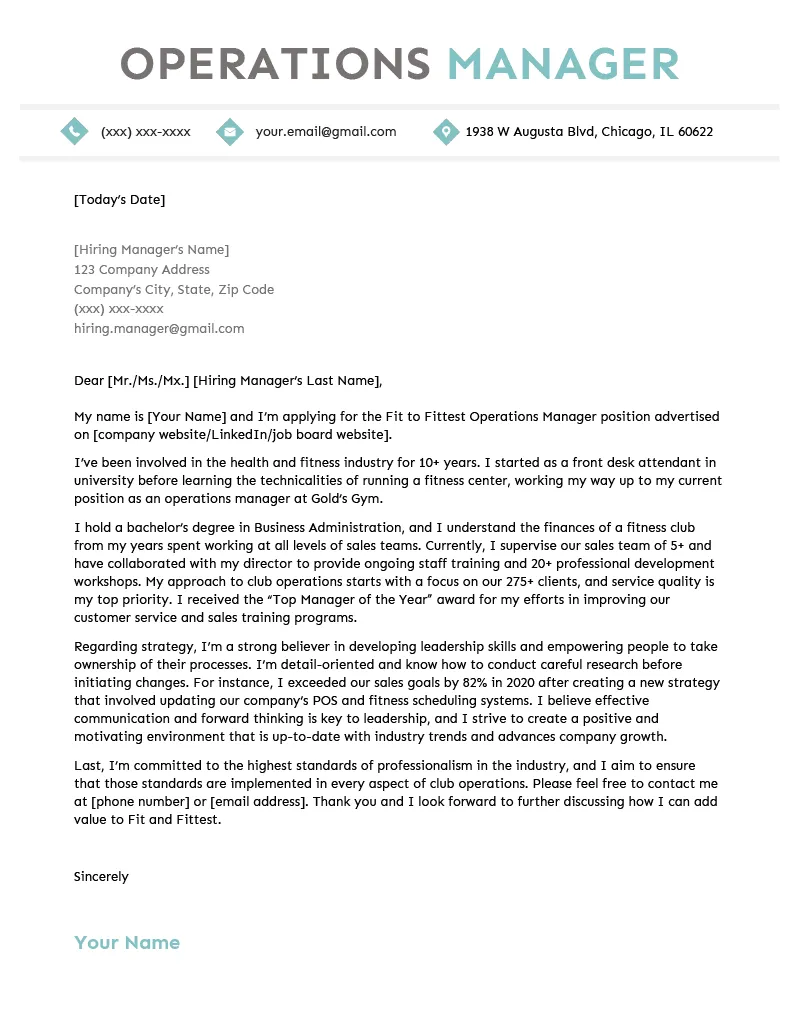Crafting a Winning Warehouse Job Cover Letter
Securing a warehouse job involves more than just submitting a resume. A compelling cover letter can significantly increase your chances of landing an interview. It’s your opportunity to showcase your personality, skills, and enthusiasm for the role. This guide provides a step-by-step approach to crafting a winning warehouse job cover letter, ensuring you make a strong impression on potential employers. It’s crucial to understand the importance of a well-written cover letter and avoid common pitfalls that can lead to rejection. By following these guidelines and utilizing the provided examples, you’ll be well on your way to securing your desired warehouse position.
Understanding the Importance of a Cover Letter
Why a Cover Letter Matters
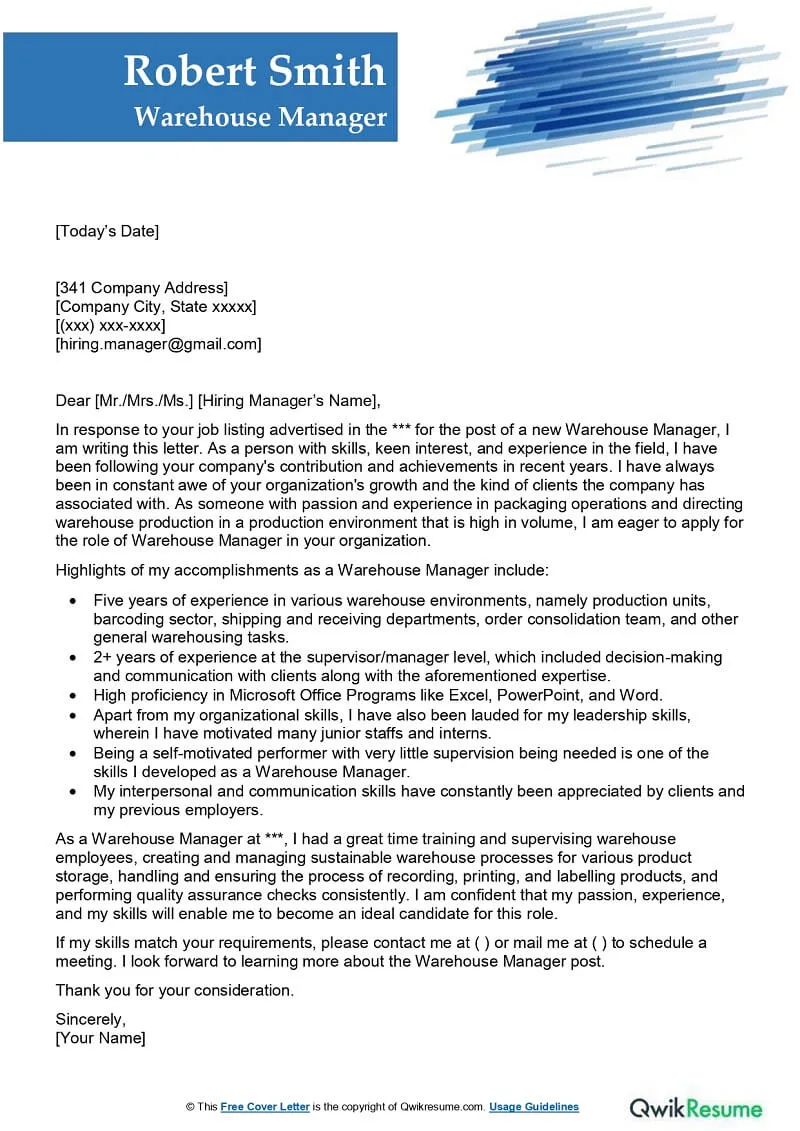
A cover letter serves as your introduction to the hiring manager. It offers a personalized narrative that complements your resume. The resume lists your qualifications, but the cover letter allows you to elaborate on those qualifications, connect your experience to the specific job requirements, and express your passion for the role and the company. It demonstrates your communication skills, attention to detail, and genuine interest, setting you apart from other applicants who might not submit a cover letter or who submit a generic one. A well-crafted cover letter shows that you’ve taken the time to understand the job and are genuinely interested in the opportunity, rather than simply applying for any available position.
Common Mistakes to Avoid
Avoid generic cover letters that aren’t tailored to the specific job or company. Generic letters suggest a lack of effort and interest. Also, proofread carefully for grammatical errors and typos. These errors can create a negative impression and undermine your credibility. Don’t simply repeat your resume; use the cover letter to elaborate on your skills and experience in a narrative format. Avoid using overly formal or informal language, and keep the tone professional and engaging. Finally, be truthful and accurate in your statements. Exaggerating your skills or experience can lead to problems down the road if you’re hired and cannot deliver on what you promised.
Key Components of a Warehouse Cover Letter
Contact Information & Date
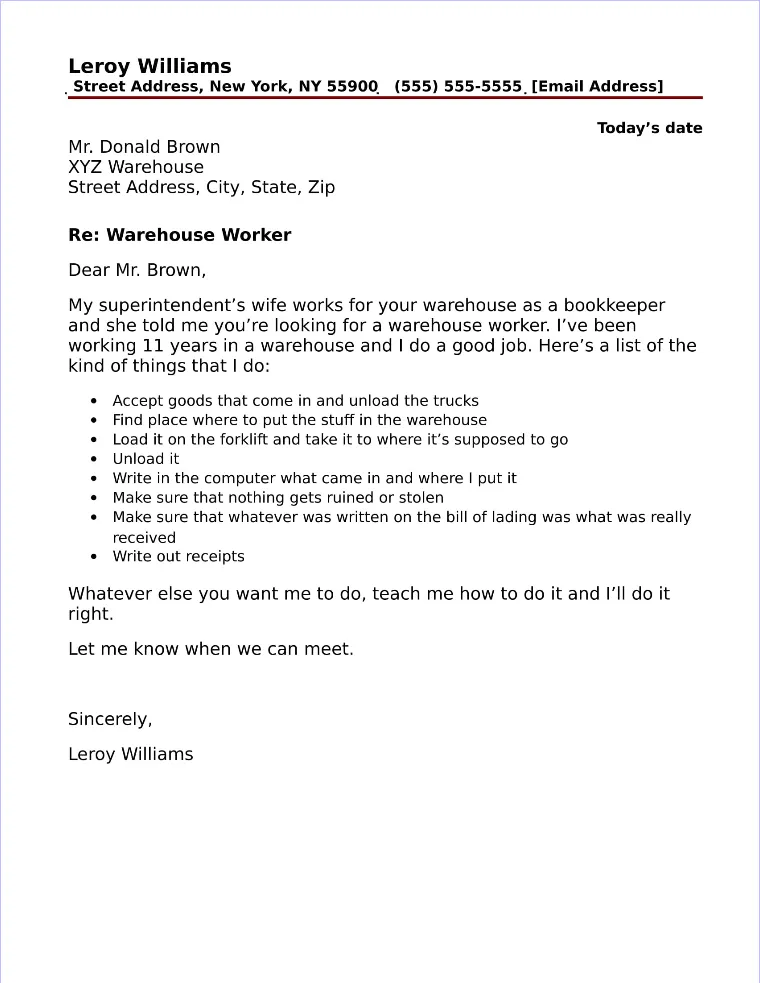
At the top of your cover letter, include your contact information, such as your name, address, phone number, and email address. Include the date you are sending the cover letter. The hiring manager needs to know how to reach you easily. Ensure your email address is professional and easy to read. This section provides the essential details the employer needs to contact you, ensuring they can reach you promptly if they are interested in proceeding further with your application. The date is important for the employer to understand when you applied for the position.
The Salutation
Use a professional salutation, such as “Dear Mr./Ms./Mx. [Last Name],” if you know the hiring manager’s name. If you don’t know the name, use “Dear Hiring Manager” or “Dear [Company Name] Hiring Team.” Avoid generic greetings like “To Whom It May Concern.” Researching the hiring manager’s name is a great way to demonstrate your initiative. Ensure the salutation is appropriate for the specific company culture. This demonstrates your respect and attention to detail, and creates a more personal connection with the reader.
Opening Paragraph: Grab Their Attention
The opening paragraph is your chance to immediately capture the reader’s attention. State the position you’re applying for and briefly explain where you found the job posting. Briefly highlight your most relevant skills or experiences. Show your enthusiasm. This sets the tone for the rest of your letter and encourages the hiring manager to continue reading. A strong opening establishes your purpose and makes a positive first impression. Mentioning the specific job title and where you saw the ad shows you’ve paid attention.
Highlighting Your Skills and Experience
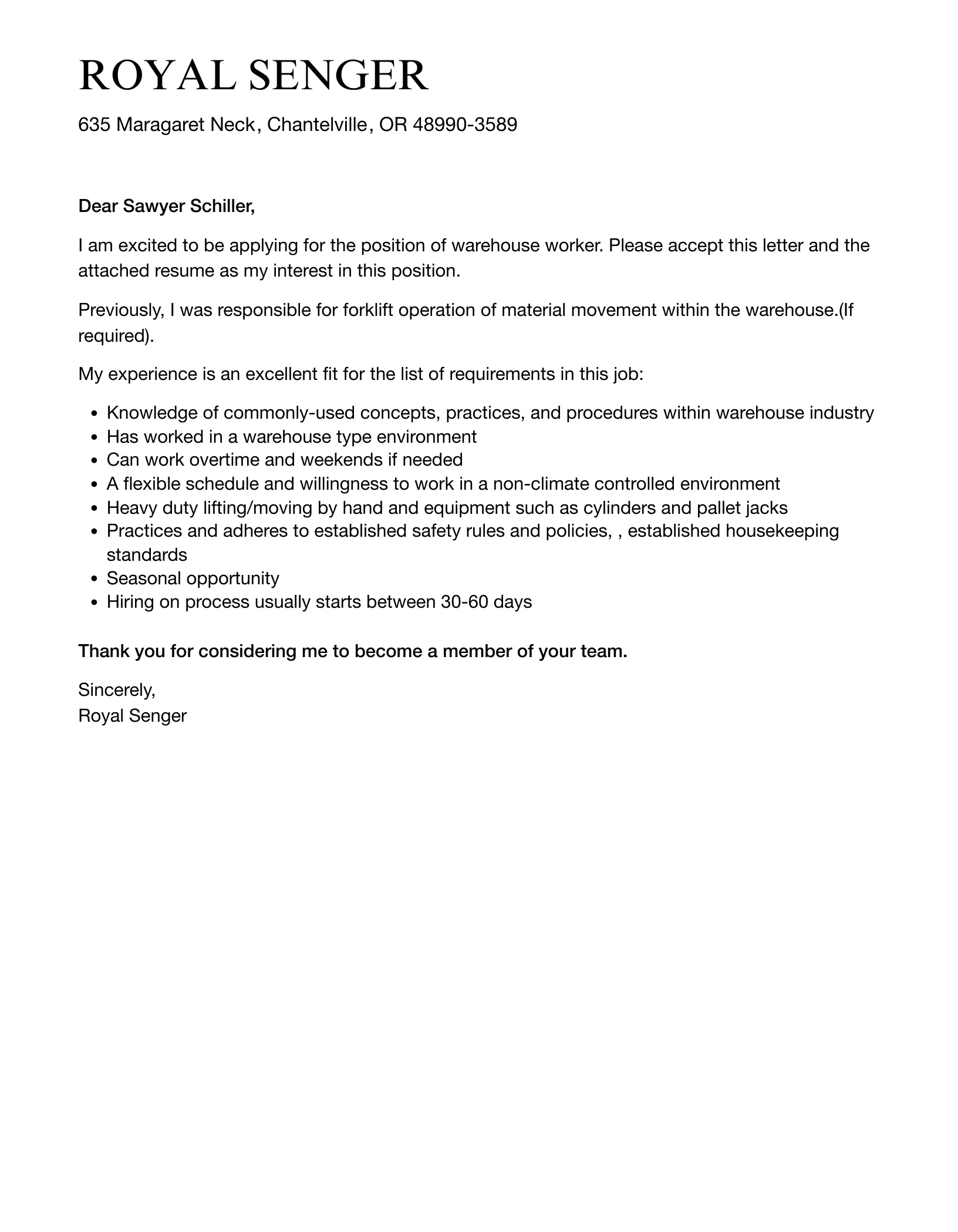
This is the core of your cover letter, where you showcase your relevant skills and experience. Tailor this section to match the job description. Provide specific examples of how you’ve successfully applied these skills. Use action verbs to describe your accomplishments and responsibilities. Quantify your achievements whenever possible to provide concrete evidence of your capabilities. This section should highlight the skills and experience that directly align with the job requirements, making it clear why you are a suitable candidate for the warehouse position. Focus on the relevant aspects of your background and quantify your accomplishments to illustrate your impact.
Warehouse Experience
If you have previous warehouse experience, be sure to detail the roles you’ve held, the tasks you performed, and the environments you worked in. Highlight any specialized equipment you’re proficient with, such as forklifts, pallet jacks, or warehouse management systems (WMS). Emphasize your familiarity with inventory management, shipping and receiving, order fulfillment, and any other relevant aspects of warehouse operations. Providing a description of your work history in a warehouse is important for the hiring manager.
Relevant Skills
Showcase skills like attention to detail, ability to lift heavy objects, teamwork, time management, and communication. Mention any certifications you hold, such as forklift operation certification or any other relevant training. Focus on the skills that the job description specifically requests. This ensures you demonstrate your ability to perform the duties effectively and efficiently. Emphasize how your skills and experience make you a valuable asset to the team. Tailor the skill list to align directly with the job posting, showing that you understand the position’s requirements.
Quantifiable Achievements
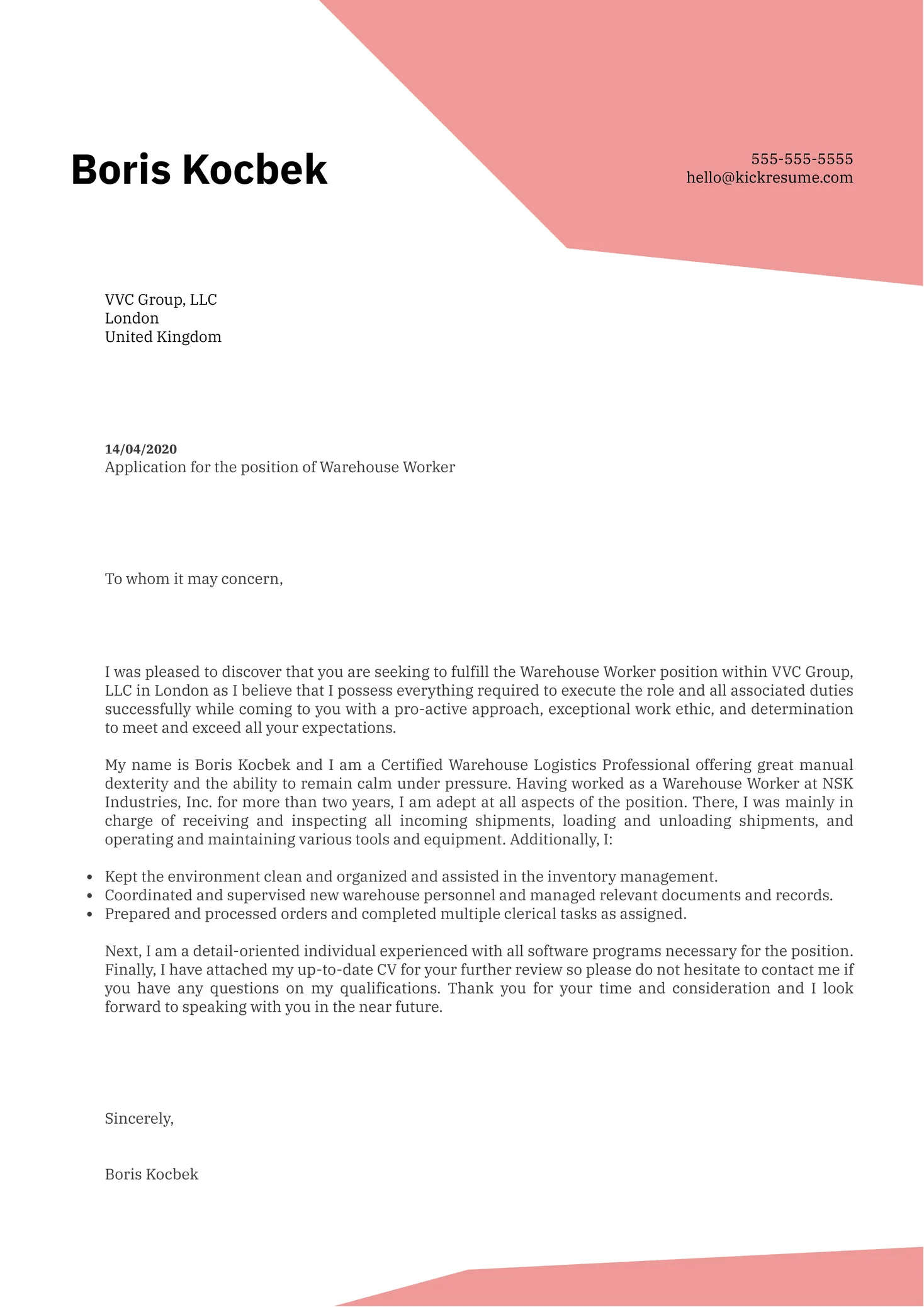
Wherever possible, quantify your achievements. Instead of saying you “managed inventory,” state that you “reduced inventory discrepancies by 15% through improved tracking methods.” Use numbers and data to demonstrate the impact of your work. For example, if you improved order processing efficiency, mention the percentage or number of orders processed. This provides concrete evidence of your abilities and showcases the value you would bring to the company. Specific achievements make your claims more credible and impactful, setting you apart from other applicants.
Expressing Your Enthusiasm
Express your genuine interest in the company and the specific role. Explain why you’re interested in this particular warehouse job and what attracts you to the company. Show that you’ve researched the company and understand its values and mission. Demonstrating genuine enthusiasm can make a lasting impression. Highlight your desire to contribute to the company’s success and explain what motivates you. It shows your positive attitude and willingness to go the extra mile.
The Closing and Call to Action
In your closing paragraph, reiterate your interest and thank the hiring manager for their time and consideration. Include a clear call to action, such as, “I am eager to discuss how my skills and experience can benefit your team. I am available for an interview at your earliest convenience.” Provide your contact information again. This demonstrates your professionalism and eagerness to take the next step in the hiring process. It assures the hiring manager that you are serious about the position and ready to take action.
Formatting and Proofreading
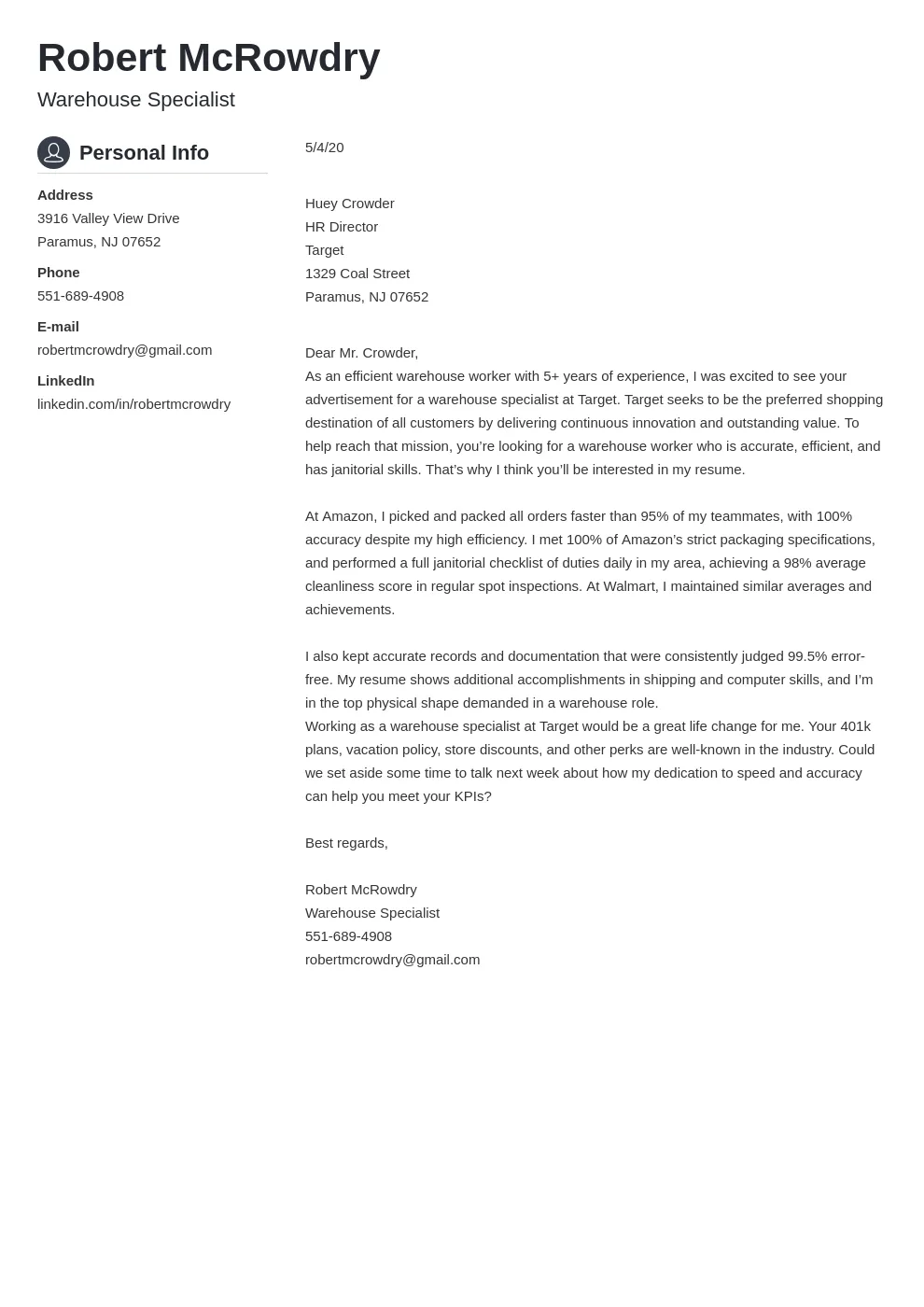
Your cover letter’s formatting and clarity are essential. Use a professional font like Times New Roman or Arial. Keep the letter concise, ideally within one page. Ensure proper spacing and use clear, easy-to-read paragraphs. Proofread the entire letter multiple times for any grammatical errors or typos. Have someone else review your letter for a second opinion. Well-formatted, error-free documents show that you pay attention to detail, and respect the reader’s time and effort.
Tailoring Your Cover Letter
A generic cover letter is unlikely to stand out. The key to success is to tailor each cover letter to the specific job and company. Research the company thoroughly to understand its values, mission, and culture. This will help you customize your letter to reflect your understanding and alignment with the company’s goals. Demonstrate that you understand the job requirements and can meet them effectively. Tailoring your cover letter shows that you’re genuinely interested in the position and have taken the time to understand the needs of the employer. This personal touch increases your chances of being called for an interview.
Researching the Company
Before writing your cover letter, research the company. Visit their website, read their “About Us” page, and check their social media profiles. Understand their products or services, their values, and their recent news. Mentioning specific company details in your cover letter, such as recent achievements or projects, demonstrates your genuine interest and shows that you’ve done your homework. This research will also help you understand the company culture and tailor your language appropriately, ensuring a more personal connection with the hiring manager.
Matching Skills to Job Requirements
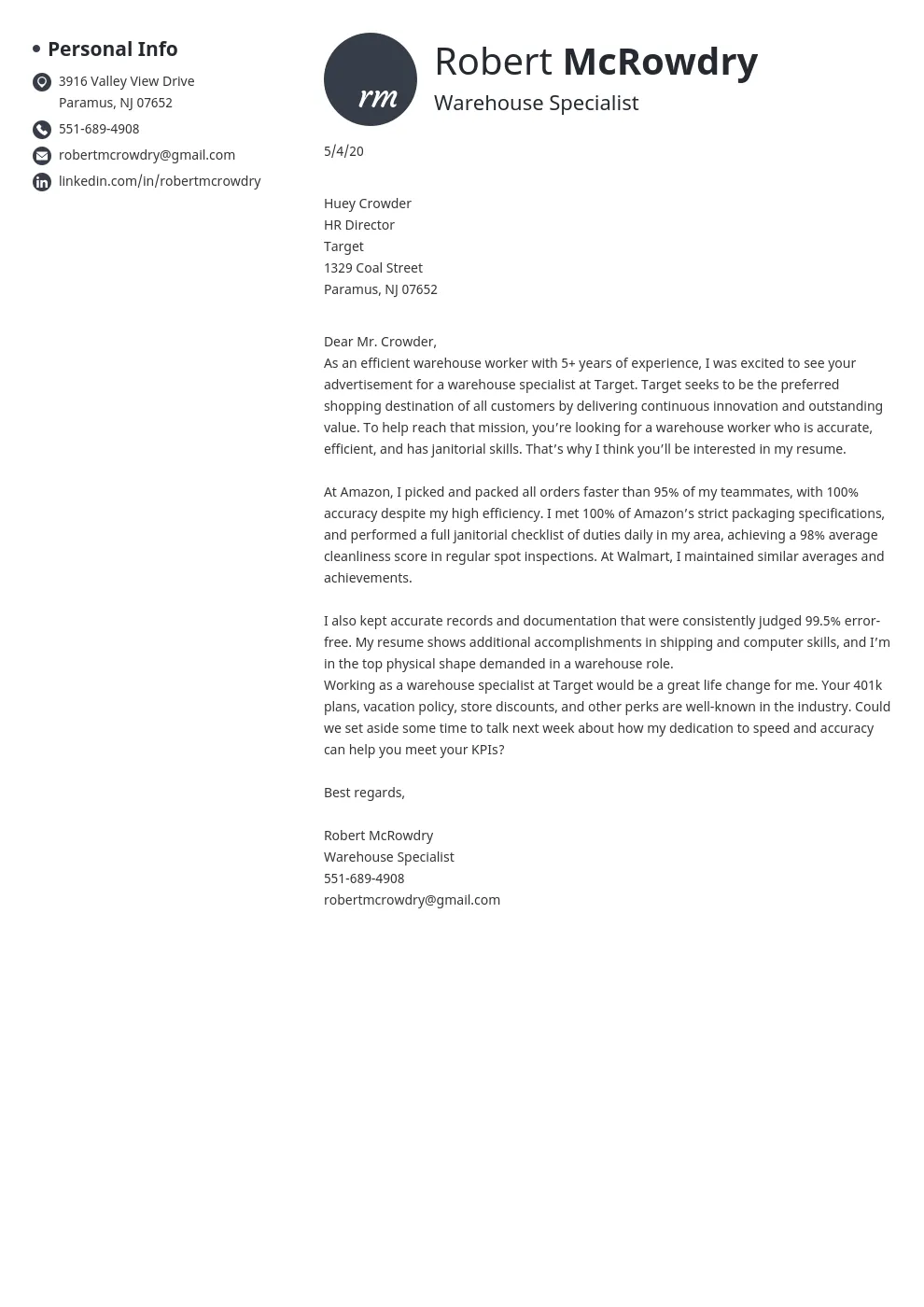
Carefully review the job description and identify the required skills and qualifications. Highlight how your skills and experience align with these requirements. Provide specific examples of how you’ve used these skills in the past, focusing on accomplishments and quantifiable results. Make sure your cover letter addresses the most important requirements. This targeted approach shows that you’ve understood what the employer is looking for and that you possess the qualities needed to succeed in the role. Tailor your response to the specific requirements of the job, showcasing your suitability for the role.
Using Keywords Effectively
Use keywords from the job description in your cover letter, but do so naturally. Avoid keyword stuffing, which can make your letter sound unnatural. Include relevant terms in your skills section and throughout the body of your letter. This practice helps ensure your cover letter gets past applicant tracking systems (ATS) and highlights your qualifications to the hiring manager. Use keywords thoughtfully to emphasize your qualifications in the same language as the job posting.
Warehouse Job Cover Letter Examples
Below are some examples of cover letters tailored to different warehouse positions. Adapt these templates to fit your specific experience and the jobs you are applying for. Each example provides a foundation, but it is critical to customize these samples for your personal circumstances. Modify these examples to include your own specific skills and achievements to make them your own.
Example 1: Entry-Level Warehouse Worker
Dear [Hiring Manager Name],
I am writing to express my interest in the Warehouse Worker position at [Company Name], as advertised on [Platform]. With my strong work ethic, physical stamina, and commitment to teamwork, I am confident I can quickly become a valuable asset to your team.
In my previous role at [Previous Company], I gained experience in [List relevant tasks, e.g., loading and unloading trucks, order picking, and maintaining warehouse cleanliness]. I am proficient with [Mention any equipment, e.g., pallet jacks] and have experience with [Mention any software or systems, e.g., inventory management systems]. I am a quick learner, highly organized, and dedicated to accuracy.
I am excited about the opportunity to contribute to [Company Name] and am eager to learn more about this position. I am available for an interview at your earliest convenience. Thank you for your time and consideration.
Sincerely, [Your Name]
Example 2: Experienced Warehouse Supervisor
Dear [Hiring Manager Name],
I am writing to express my interest in the Warehouse Supervisor position at [Company Name]. With seven years of experience in warehouse management, I am confident I possess the skills and experience to lead and motivate your team.
In my role at [Previous Company], I supervised a team of 15 warehouse workers and oversaw all warehouse operations. I implemented [Mention improvements, e.g., new inventory management systems] which resulted in a 10% reduction in inventory errors and a 15% improvement in order fulfillment efficiency. I have extensive experience with [Mention relevant skills, e.g., forklift operation, safety protocols, and performance management].
I am highly motivated and have a proven track record of improving warehouse efficiency and employee productivity. I am enthusiastic about the prospect of joining [Company Name]. Thank you for considering my application.
Sincerely, [Your Name]
Example 3: Warehouse Manager
Dear [Hiring Manager Name],
I am writing to apply for the Warehouse Manager position at [Company Name]. With over ten years of experience in warehouse management, I am confident I can contribute to your organization’s success.
During my tenure at [Previous Company], I was responsible for all aspects of warehouse operations, including inventory management, logistics, and team leadership. I led a team of 30 employees, implemented [Mention significant projects, e.g., warehouse layout optimization], which increased storage capacity by 20%, and decreased shipping costs by 12%. I am skilled in [Mention key skills, e.g., budget management, process improvement, and compliance].
I am eager to bring my skills and experience to [Company Name] and contribute to the growth and success of your team. Thank you for your consideration.
Sincerely, [Your Name]
Tips for Success
Beyond the basics, there are further steps you can take to make your cover letter stand out. Consider these additional tips to improve your application and increase your chances of securing an interview for a warehouse job. Following these practices will not only improve your chances of getting a warehouse job, but will also build your confidence.
Reviewing and Editing Your Cover Letter
After writing your cover letter, review it multiple times. Ensure there are no typos or grammatical errors. Check that your content flows logically and effectively communicates your message. The final edit is vital because it catches mistakes and strengthens the impact of your application. Proofreading helps ensure that your cover letter is polished and professional. A well-edited cover letter demonstrates your attention to detail and commitment to accuracy.
Seeking Feedback from Others
Ask trusted friends, family members, or career advisors to review your cover letter. Get feedback on clarity, content, and tone. Fresh eyes can catch errors or provide suggestions for improvement. This process will help to identify areas for improvement that you may have missed. Feedback from others can bring a new perspective and make your letter even stronger. Sharing your draft can give you valuable insight into how the hiring manager will view your letter.
Following Up After Submission
After submitting your cover letter and resume, follow up with the hiring manager or recruiter. Send a brief email or make a phone call a week or two after applying to express your continued interest and inquire about the status of your application. This shows your enthusiasm and initiative. Following up is a polite way to keep your application top-of-mind. If you don’t hear back within a reasonable timeframe, consider sending a follow-up email. However, be respectful of their time. Do not overwhelm them with communication, as it can be counterproductive. Thank the hiring manager for their time. Demonstrate your ongoing enthusiasm for the position.
